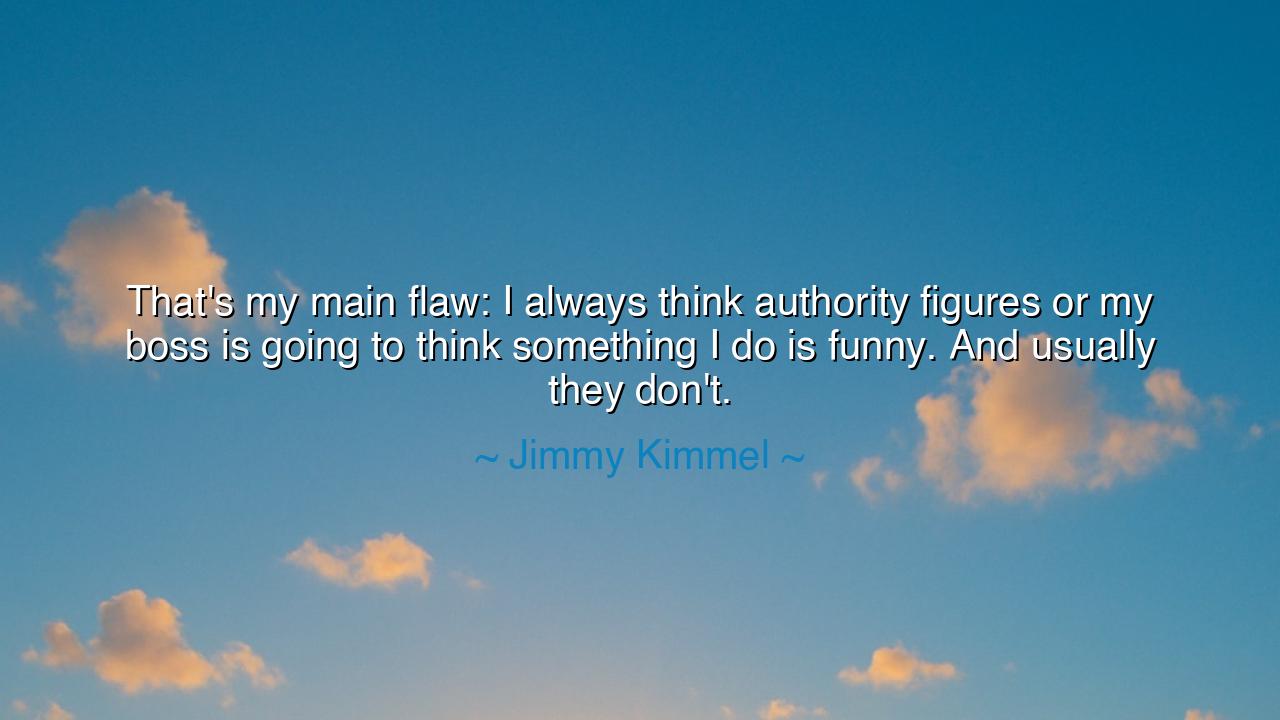
That's my main flaw: I always think authority figures or my boss
That's my main flaw: I always think authority figures or my boss is going to think something I do is funny. And usually they don't.






When Jimmy Kimmel confesses, “That’s my main flaw: I always think authority figures or my boss is going to think something I do is funny. And usually they don’t,” he speaks with the voice of every soul who has ever tried to lighten the solemn faces of power, only to find silence in return. Beneath the laughter lies a truth both humble and human — the yearning to be understood, the fragile hope that even those who command us might share our sense of joy. Yet Kimmel’s reflection is not merely about humor, but about the eternal misstep of seeking approval from those who cannot grant it, for laughter is a bridge that the proud often refuse to cross.
The ancients knew well the perils of jesting before kings. In the courts of emperors and tyrants stood the fools, those strange men of wit and wisdom who were permitted to speak truth in riddles and laughter. One such figure was Archibald Armstrong, jester to King James I of England. His words could charm a court or endanger his life, depending on whether the monarch found them amusing or insolent. In his story we see Kimmel’s dilemma magnified — the fool who risks all to make authority laugh, knowing that in laughter lies both danger and redemption. For when power cannot laugh, it grows cruel; and when the honest heart cannot jest, it grows fearful.
To believe authority will find humor in truth is an act of innocence, even of courage. For the joke is not merely a jest; it is often a small rebellion, a spark of freedom in the shadow of control. Yet Kimmel admits that this is his “flaw” — that he forgets the powerful often see laughter not as kinship, but as irreverence. The jest that humanizes may also offend. And so, time and again, the fool learns the oldest lesson of wisdom: that truth clothed in humor walks a narrow road between acceptance and exile.
Yet within this humility lies a deeper virtue — the refusal to surrender one’s humor to fear. The man who dares to jest before authority, even when unappreciated, keeps his soul alive. For laughter is the weapon of the powerless, the fire of those who refuse to bow entirely. Recall the tale of Diogenes the Cynic, who once mocked Alexander the Great himself. When the conqueror asked if he could grant him any favor, Diogenes replied, “Yes — stand out of my sunlight.” The crowd gasped, yet Alexander, amused, declared, “If I were not Alexander, I would wish to be Diogenes.” Here, humor became truth; wit became dignity. But not all rulers are so kind, and not all bosses so wise.
Thus Kimmel’s confession carries both comedy and tragedy. It is the story of the heart that still believes humor can unite — that laughter can melt the walls of hierarchy. But the world, being full of pride and fear, often rejects such innocence. The wise must learn, then, to wield humor not for approval, but for connection. The laugh that matters most is not the one given by authority, but the one that rises from the shared humanity of equals. To make a superior laugh is vanity; to make a friend laugh is grace.
So what lesson, then, should we draw? Do not silence your humor for fear of rejection, but do not seek laughter as validation. Speak your truth with lightness, but anchor it in wisdom. When your jest falls flat before the mighty, do not be dismayed — for laughter that is misunderstood is still sacred if it is born from sincerity. Let your wit be an offering, not a weapon; a mirror, not a mask. Those who can laugh at themselves are truly free, and those who laugh only at others remain bound by their own pride.
Therefore, dear listener, let this teaching settle in your heart: authority may not laugh, but the universe smiles upon authenticity. Be as the fool who speaks truth through joy, unashamed when the powerful fail to understand. For in the end, laughter is not for the approval of kings, but for the liberation of the soul. To jest in honesty, even when unreceived, is to remain human in a world too often grave. And perhaps, one day, even the sternest ruler — or the coldest boss — will remember your courage and smile.






AAdministratorAdministrator
Welcome, honored guests. Please leave a comment, we will respond soon